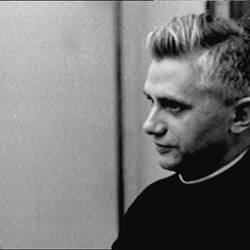 At about 2pm on the day the Pope made his announcement, I switched on BBC news and was delighted to witness the following:
At about 2pm on the day the Pope made his announcement, I switched on BBC news and was delighted to witness the following:
ANCHORMAN: And we can now go over live to Munich, Benedict’s hometown (sic) where our correspondent has been assessing the Pope’s legacy.
CORRESPONDENT: Thanks Jim. The theologian Hans Ku…
ANCHORMAN: We seem to be having some technical difficulties here… we’ll try and get back to Munich as soon as we can. Now with all the business news…
Divine intervention? Who knows, but sadly it was merely a stay of execution.
The Kuengian criticism of Benedict is this: that Ratzinger, the sometime enfant terrible, was scared by the fallout from Humanae Vitae. That he was horrified by the upheavals of 1968. That this experience turned a radical young priest into a reactionary “panzerkardinal” and a bitter, misanthropic Pope. It is, if not the most widespread, certainly the most annoying of all the shallow punditry of the past week.
Most annoying because the opposite is true. Most annoying because not Ratzinger but Kueng, and many like him are the ones who couldn’t read the signs of the times in 1968.
Most annoying because if we are asked ‘what is the legacy?’ and we allow ourselves to be drawn into this Blairite silliness of a question, the best answer we can give is to say: “this man is a radical thinker in the very best sense; he is a radical, and this radicalism has been played out in front of you though you can’t see it, and the reason you can’t see it is because you imagine yourselves to be radicals when in fact you are conformists.”
The problem surely is that Kueng et al embraced ‘radicalism’ for its own sake. They lived in a ‘radical’ decade and they wanted to fit in, and therefore jumped on every hippie charabanc that would take them. Theirs was a false radicalism because ‘radical’, literally, means ‘to do with the roots’, the radix . But they had, and have, little interest in roots.
Benedict’s radicalism is true radicalism. By insisting that we recover our ‘patrimony’, as he did in his pontificate-defining address to the Curia in 2005, he calls us to a much stronger, more sensible starting point for a dialogue with modernity. Stronger because it strips away the stridency and the triumphal shell which built around the Church during the age of Christendom, and exposes the teaching of Jesus in all its simplicity and purity.
In particular, it is his teaching on relations between the Church and the modern state, enunciated with such clarity and reasonableness in Westminster Hall in 2010 and the Bundestag in 2011 (and indeed before his election in his famous debate with Juergen Habermas), which I believe we will remember him by. It is the fruit of a radical, imaginative way of thinking and it gives us a basis for a dialogue we need urgently to pursue. Perhaps we will talk in the future, if you will excuse the pun, about Benedict’s Theology of the Body Politic as reverently as we talk today about John Paul’s Theology of the Body.
